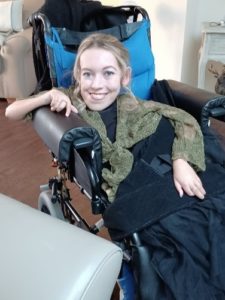Hayleigh’s Story
Hayleigh’s Story
Hayleigh shares her story about a particularly difficult time she and her family went through, and the importance of the specialist healthcare they experienced, over 20 years ago.
 Hello, my name is Hayleigh, I have SMA Type 2, and I am going to talk about my experiences of differences in healthcare which led to difficult decisions. To do this, I’m taking you all the way back to 2001 when I was 13 years old and ended up in hospital with what I assumed was a typical chest infection. Within 24 hours, I was fighting for my life.
Hello, my name is Hayleigh, I have SMA Type 2, and I am going to talk about my experiences of differences in healthcare which led to difficult decisions. To do this, I’m taking you all the way back to 2001 when I was 13 years old and ended up in hospital with what I assumed was a typical chest infection. Within 24 hours, I was fighting for my life.
Not many people know this story; I don’t even think my friends know, as much of it still gives me a sinking feeling in my stomach all these years on. You know the one, it tells you to smile, carry on, pretend it doesn’t matter. But for SMA Awareness Month, I think it’s important to have difficult discussions and challenge perceptions, so without any further delay, let’s delve in.
It started with a cold, it always does, and sure enough I soon landed in the local hospital with a chest infection. Bloods taken, SATs monitored. So far, pretty standard. I knew the doctors and nurses, I knew the drill, eat, sleep, physio, repeat. I knew what was expected of me. But somewhere down the line my body forgot.
I remember feeling exhausted, I remember the oxygen mask, tears, and needles. I remember it all. At least I think I do. The room lights were dimmed and I fell asleep.
The next day I woke up, unable to speak as there was a tube going down to my chest. A doctor then arrived to remove it. Mum sat beside me. I joked that here we are again in hospital. Not to worry, I’d be out in a couple of weeks. It was then I found out that for the past three days I had been put under sedation and had been asleep, after being transferred from the local hospital to our specialist one.
The night I had been taken ill, the antibiotics proved ineffective and the infection spread too quickly, meaning that the little oxygen which was able to get into my system had no way of getting out, leading to me falling unconscious.
I don’t remember any of this. My mum was with me at the hospital and she knew how serious my situation was, but she had a plan…
For years my condition had been monitored and assessed between two hospitals – my local and the specialist one. My mum insisted that I be transferred immediately to the specialist hospital and, after lots of indecision, this was finally agreed. All I had to do was to get there in time.
Two doctors arrived from the specialist hospital, and apparently a calmness fell over the room. They told everyone to vacate the room as they began working on me. They intubated me – probably to ensure it was done to their exact standards – and prepared me for transfer. One doctor reassured my mum that they would keep me safe. They blue-lighted the ambulance, telling my family to follow behind. If the siren started, we were to cut through red lights. Any issues could be dealt with afterwards.
We were on our way to my specialist hospital.
Again I don’t remember any of this: We arrived and I was taken straight to intensive care where the doctors could stabilise me, monitor my oxygen and carbon dioxide, prepare an intense course of antibiotics, and give my body time to rest and repair. Another doctor escorted my mum to a waiting area. I was in safe hands, he said. They would save me.
And they did. There was never any doubt.
At the specialist hospital, between the intensive care doctors and nurses, my respiratory and neurology Consultants, my chest infection and SMA was treated as another day at the office. It was nothing they hadn’t dealt with before. They had the expertise and equipment. I had my life back.
I remember feeling angry about the difference in healthcare and understanding of my condition. Angry that my body had ‘failed’ and that there was nothing I could do about it. Angry about the vital decisions that were made and not made. And angry that I couldn’t remember the past 3 days.
They say that when someone goes unconscious the brain is still aware of the happenings around it. If that’s true, then my brain chose to forget, and I’m not sure why. Maybe angry is the wrong word. Perhaps it was fear. A 13-year-old girl shouldn’t have to know.
Sometimes I wish I could go back and tell her everything will be fine. In 7 weeks, she’ll be out of hospital. She will go to university. She will gain a Doctorate. She will publish a book. She will see the world. One day she will be able to tell people her story.
